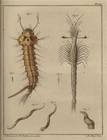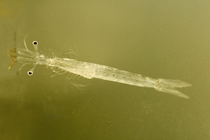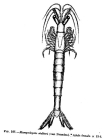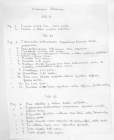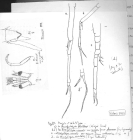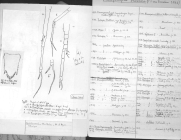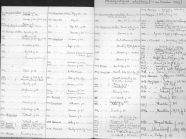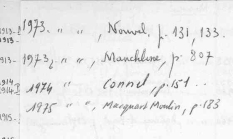
| Intro | | About | | Wiki | | Search traits | | Data explorer | | Literature | | Definitions | | Sources | | Webservices | | Statistics | | Feedback | | Editors | | Log in |
AfReMaS taxon detailsMesopodopsis slabberi (Van Beneden, 1861)
120072 (urn:lsid:marinespecies.org:taxname:120072)
accepted
Species
marine, brackish, fresh,
(of ) Beneden, P.J. van. (1861). Recherches sur les Crustacés du littoral de Belgique. [Research on Crustaceans of the Belgian coast.]. <em>Memoires de l'Academie royale des sciences de Belgique.</em> 33: 1-180, pls. 1-31., available online at https://www.biodiversitylibrary.org/bibliography/119687#/summary [details]
Mees, J.; Meland, K.; Väinölä, R. (Eds) (2012 onwards). World List of Lophogastrida, Stygiomysida and Mysida. Mesopodopsis slabberi (Van Beneden, 1861). Accessed through: Odido, M.; Appeltans, W.; BelHassen, M.; Mussai, P.; Nsiangango, S.E.; Vandepitte, L.; Wambiji, N.; Zamouri, N. Jiddou, A.M. (Eds) (2025) African Register of Marine Species at: https://marinespecies.org/afremas/aphia.php?p=taxdetails&id=120072 on 2025-04-25
Odido, M.; Appeltans, W.; BelHassen, M.; Mussai, P.; Nsiangango, S.E.; Vandepitte, L.; Wambiji, N.; Zamouri, N. Jiddou, A.M. (Eds) (2025). African Register of Marine Species. Mesopodopsis slabberi (Van Beneden, 1861). Accessed at: https://www.marinespecies.org/afremas/aphia.php?p=taxdetails&id=120072 on 2025-04-25
Date action by
original description
(of ) Beneden, P.J. van. (1861). Recherches sur les Crustacés du littoral de Belgique. [Research on Crustaceans of the Belgian coast.]. <em>Memoires de l'Academie royale des sciences de Belgique.</em> 33: 1-180, pls. 1-31., available online at https://www.biodiversitylibrary.org/bibliography/119687#/summary [details]
taxonomy source Pillai, N. K. (1968). A revision of the genus Mesopodopsis Czerniavsky (Crustacea: Mysidacea). <em>Journal of the Zoological Society of India.</em> 20: 6-24. [details] Available for editors taxonomy source Tattersall, W. M. (1951). A review of the Mysidacea of the United States National Museum. <em>Smithsonian Institution United States National Museum Bulletin.</em> 201: 1-292., available online at https://play.google.com/store/books/details?id=-vhMAAAAYAAJ&rdid=book--vhMAAAAYAAJ [details] Available for editors taxonomy source Zimmer, C. (1915). Die Systematik des Tribus Mysini H.J. Hansen. <em>Zoologischer Anzeiger.</em> 46: 202-216., available online at https://www.biodiversitylibrary.org/page/29985710 [details] taxonomy source Norman, A.M. 1892 . On British Mysidae, a family of Crustacea Schizopoda. - Ann. Mag. nat. Hist., ser. 6, 10: 143-166, 242-263, 2pls, available online at https://www.biodiversitylibrary.org/page/27658748 [details] context source (Schelde) Maris, T., O. Beauchard, S. Van Damme, E. Van den Bergh, S. Wijnhoven & P. Meire. (2013). Referentiematrices en Ecotoopoppervlaktes Annex bij de Evaluatiemethodiek Schelde-estuarium Studie naar “Ecotoopoppervlaktes en intactness index”. [Reference matrices and Ecotope areas Annex to the Evaluation methodology Scheldt estuary Study on “Ecotope areas and intactness index”. <em>Monitor Taskforce Publication Series, 2013-01. NIOZ: Yerseke.</em> 35 pp. (look up in IMIS) [details] context source (BeRMS 2020) Bio-environmental research group; Institute of Agricultural and Fisheries research (ILVO), Belgium; (2015): Zooplankton monitoring in the Belgian Part of the North Sea between 2009 and 2010. [details] additional source Zimmer, C. (1933). Mysidacea. <em>In: Grimpe, G. & E. Wagler, (eds.), Die Tierwelt der Nord- und Ostsee. Leipzig, Akad. Verlagsbuchhandl.</em> 23 (10): 26-69. [details] Available for editors additional source Bacescu, M. (1934). Contributions à l'étude des mysidés de la Mer Noire ainsi que des limans et des lacs en relation avec la mer ou avec la Danube. <em>Ann. Sci. Univ. Jassy.</em> 19: 331-338. [details] Available for editors additional source Bacescu, M. (1940). Les Mysidacés des eaux Roumaines (Étude taxonomique, morphologique, bio-géographique et biologique). <em>Ann. Sci. Univ. Jassy.</em> 26: 453-804, 4 pls. [details] Available for editors additional source Mees, J.; Dewicke, A.; Hamerlynck, O. (1993). Seasonal Composition and Spatial Distribution of Hyperbenthic Communities Along Estuarine Gradients in the Westerschelde. <em>Netherlands Journal of Aquatic Ecology.</em> 27, 2-4, 359-376. (look up in IMIS) [details] Available for editors additional source Tattersall, W. M. (1951). A review of the Mysidacea of the United States National Museum. <em>Smithsonian Institution United States National Museum Bulletin.</em> 201: 1-292., available online at https://play.google.com/store/books/details?id=-vhMAAAAYAAJ&rdid=book--vhMAAAAYAAJ [details] Available for editors additional source Gordan, J. (1957). A bibliography of the order Mysidacea. <em>Bull. Am. Mus. Nat. Hist.</em> 112 (4): 281-393. [details] Available for editors additional source Mauchline, J.; Murano, M. (1977). World list of the Mysidacea, Crustacea. <em>J. Tokyo Univ. Fish.</em> 64 (1): 39-88. (look up in IMIS) [details] additional source Mauchline, J. (1980). The biology of mysids and euphausiids. <em>In: J.H.S. Blaxter, F.S. Russell & M. Young (eds.), Advances in Marine Biology.</em> 18: 1-681 Academic Press, London). [details] Available for editors additional source BEAUDOUIN, J. (1979). Euphausicés, mysidacés, larves de décapodes du Golfe de Gascogne (plateau continentale) en 1971 et 1972. - Rev. Trav. Inst. Pêch. marit., 43 (4): 367-389 [details] Available for editors additional source BENOIT-BIRD KJ, AU WWL, BRAINARD RE, LAMMERS MO (2001). Diel horizontal migration of the Hawaiian mesopelagic boundary community observed acoustically MEPS 217:1-14 : [details] Available for editors additional source COLOSI, G. (1929). I Misidacei del Golfo di Napoli. Pubbl. Staz. Zool. Napoli, 29: 405-441 [details] Available for editors additional source COLOSI, G. (1930). Remarques sur la distribution horizontale et verticale des mysidés mediterranéens. - Bull. Soc. Océnogr. France, 10: 983-985 [details] Available for editors additional source CUNHA, M.R. & JORBE J.C. & BERNARDES C. (1997). On the structure of the neretic suprabenthic communities from the Portugese continental margin Marine Ecology progress series 157: 119-137 [details] Available for editors additional source DEDIU, I.I. (1966). Répartition et charactéristique écologique des mysides des bassins des rivières Dniestr et Pruth. - Rev. roum. Biol. (Zool.), 11: 233-239. [ecology [details] Available for editors additional source Dörjes, J.; Michaelis, H.; Rhode, B. (1986). Long-term studies of macrozoobenthos in intertidal and shallow subtidal habitats near the islands of Norderney (East Frisian coast, Germany). <em>Hydrobiologia.</em> 142: 217-232. [details] Available for editors additional source Tattersall, O.S. (1952). Report on a small collection of Mysidacea from estuarine waters of South Africa. Transactions of the Royal Society of South Africa 33(2): 153-187 [details] Available for editors additional source Tattersall, O.S. (1957). Report on a small collection of Mysidacea from the Sierra Leone estuary together with a survey of the genus Rhopalophthalmus Illig and a description ofa new species of Tenagomysis from Lagos, Nigeria. <em>Proceedings of the Royal Society London.</em> 129: 81-128. [details] Available for editors additional source Wittmann, K.J. (1985). Freilanduntersuchungen zur Lebensweise von Pyroleptomysis rubra, einer neuen bentho-pelagischen Mysidacee aus dem Mittelmeer und dem Roten Meer. <em>Crustaceana.</em> 48 (2): 152-166. [details] Available for editors additional source Wittmann, K.J. (1992). Morphogeographic variations in the genus Mesopodopsis Czerniavsky with descriptions of three new species (Crustacea, Mysidacea). <em>Hydrobiologia.</em> 241: 71-89. [details] Available for editors additional source Katagan, T. (1985). Mysidaces et cumaces des cotes Egeennes de Turquie. <em>Rapp. P.-v. Réun. Comm. int. Explor. sci. Mer. Medit.</em> 29 (5): 287-288. [details] Available for editors additional source Hanamura, Y.; Kase, T. (2002). Marine cave mysids of the genus Palaumysis (Crustacea: Mysidacea), with a description of a new species from the Philippines. <em>Journal of Natural History.</em> 36: 253-263. (look up in IMIS), available online at https://doi.org/10.1080/00222930010004241 [details] Available for editors additional source Müller, H. G. (1993). World catalogue and bibliography of the recent Mysidacea. 238p. [details] Available for editors additional source Sars, G.O. (1877). Nye Bidrag til Kundskaben om Middelhavets Invertebratfauna I. Middelhavets Mysider. <em>Arch. Math. Naturvidenskaberne.</em> 2: 10-119, 36pls., available online at https://www.biodiversitylibrary.org/page/10962561 [details] additional source Tattersall, W.M.; Tattersall, O.S. (1951). The British Mysidacea. <em>Ray Society, London.</em> 1-460, figs. 1-118. (look up in IMIS) [details] Available for editors additional source WEBB, P., R. PERISSINOTTO & T.H. WOOLDRIDGE (1987): Feeding of Mesopodopsis slabberi (Crustacea, Mysidacea) on naturally occuring phytoplankton. - Mar. Ecol. Progr. Ser., 38 (2): 115-123 [details] Available for editors additional source Zimmer C. (1909): Die nordischen Schizopoden. K. Brandt & C. Apstein (eds.), Nordisches Plankton. Lipsius und Tischler, Kiel und Leipzig, 6: 1-178 [details] additional source Mees, J.; Cattrijsse, A.; Hamerlynck, O. (1993). Distribution and abundance of shallow-water hyperbenthic mysids (Crustacea, Mysidacea) and euphausiids (Crustacea, Euphausiacea) in the Voordelta and the Westerschelde, southwest Netherlands. <em>Cahiers de Biologie Marine.</em> 34: 165-186. (look up in IMIS) [details] Available for editors additional source Fockedey, N.; Mees, J. (1999). Feeding of the hyperbenthic mysid Neomysis integer in the maximum turbidity zone of the Elbe, Westerschelde and Gironde estuaries. <em>Journal of Marine Systems.</em> 22, 207-228. [details] Available for editors additional source Zekeria Abdulkerim (1992): Life history and production of Neomysis integer in teh brackish part of the Westerschelde [details] additional source De Batselier Karine (1995): Hyperbenthische gemeenschappen van het Belgisch Kontinentaal plat [details] additional source Muller, Y. (2004). Faune et flore du littoral du Nord, du Pas-de-Calais et de la Belgique: inventaire. [Coastal fauna and flora of the Nord, Pas-de-Calais and Belgium: inventory]. <em>Commission Régionale de Biologie Région Nord Pas-de-Calais: France.</em> 307 pp., available online at http://www.vliz.be/imisdocs/publications/145561.pdf [details] additional source Ariani, A. P. (1967). Osservazioni su Misisdacei della costa adriatrica pugliese. <em>Ann. Ist. Mus. Zool. Univ. Napoli.</em> 18 (5): 51-38, pls. I-III. [details] Available for editors additional source Breton, G.; Girard, A.; Lagardère J.-P. (1995). Espèces animales benthiques des bassins du port du Havre (Normandie, France) rares, peu connues ou nouvelles pour la région. <em>Bulletin trimestriel de la Société Géolologique Normandie Amis Musée du Havre.</em> 82(3): 7-28. [details] Available for editors additional source Dewicke, A., V. Rottiers, J. Mees & M. Vincx. (2002). Evidence for an enriched hyperbenthic fauna in the Frisian front (North Sea). <em>Journal of Sea Research.</em> 47(2): 121-139. (look up in IMIS), available online at https://doi.org/10.1016/s1385-1101(02)00106-5 [details] Available for editors additional source Furnestin, M.L. (1960). Zooplancton du golfe du Lion et de la côte orientale de Corse. [Zooplankton of the Gulf of Lion and the eastern coast of Corsica.]. <em>Revue Travaux Institut des Peches Maritimes, Paris.</em> 24(2):153-252, figs. 1-66, tab. 1. (vi-1960). [details] Available for editors additional source Wooldridge, T.H. & C. Bailey. (1982). Euryhaline zooplankton of the Sundays estuary and notes on trophic relationships. <em>South African Journal of Zoology.</em> 17(4):151-163, figs. 1-9, tabs. 1-3. [details] Available for editors additional source Ariani, A.P.; Wittmann, K.J. (2000). Interbreeding versus morphological and ecological differentiation in Mediterranean Diamysis (Crustacea, Mysidacea), with description of four new taxa. <em>Hydrobiologia.</em> 441: 185-236. [details] Available for editors additional source Bacescu, M. (1936). Hemimysis lamornae, subsp., reducta nov. subsp. et Hemimysis anomala, dans les eaux Roumaines de la Mer Noire (avec une étude comparative des formes de Hem. lamornae des autres mers: H.L. typica et H.L mediterranea nov. sbsp.). <em>Annales Scientifiques de l´Université de Jassy.</em> 19 (1-4): 331-338. [details] Available for editors additional source Wittmann, K.J. (2001). Centennial changes in the near-shore mysid fauna of the Gulf of Naples (Mediterranean Sea), with description of <i>Heteromysis riedli</i> sp. n. (Crustacea, Mysidacea). <em>Marine Ecology.</em> 22(1-2): 85-109. [details] Available for editors additional source Bacescu, M. (1949). Données sur la faune carcinologique de la Mer Noire de long de la côte Bulgare. <em>Travaux Station Biologique Maritine de Varna (Bulgarie).</em> 14 (1948): 1-24 (in French). [details] Available for editors additional source Bacescu, M. (1954). Mysidacea. <em>In: Fauna Republicii Populare Romîne, Crustacea, IV (3). Academia Republicii Populare Romîne, Bucuresti.</em> Pages 1-126. [details] Available for editors additional source Bacescu, M. (1956). Cumopsis fagei n. sp., Cumaceé nouveau, provenant des eaux du littoral Francais de la manche. <em>Vie et Milieu.</em> 7 (3): 357-365. [details] Available for editors additional source Hanamura, Y. 1999. Seasonal abundance and life cycle of Archaeomysis articulata (Crustacea: Mysidacea) on a sandy beach of western Hokkaido, Japan.-- Journal of Natural History 33: 1811-1830. [details] Available for editors additional source Illig, G. (1930). Die Schizopoden der deutschen Tiefsee-Expedition. <em>Rep. Valdivia Exped.</em> 22: 397-625. [details] Available for editors additional source Hostens, K.; Mees, J. (1999). The mysid-feeding guild of demersal fishes in the brackish zone of the Westerschelde estuary. <em>Journal of Fish Biology.</em> 55(4): 704-719. (look up in IMIS), available online at https://doi.org/10.1006/jfbi.1999.1026 [details] additional source Katagan, T.; Kocataş, A. (1995). Boreomysis arctica (Krøyer), espèce nouvelle pour la mer de Marmara, Turquie (Mysidacea). <em>Crustaceana.</em> 68(3), 396-397. [details] Available for editors additional source Künne, C. 1939. Beiträge zur Kenntnis der Mysideenfauna der südlichen Nordsee.-- Zoologische Jahrbücher. Abteilung für Systematik, Ökologie und Geographie der Tiere 72: 329-358. [details] Available for editors additional source Lasiak, T.A. 1983. The impact of surf-zone fish communities on faunal assemblages associated with sandy beaches. Pages 501-506, In: McLachlan, A., & T. Erasmus (eds.), Sandy Beaches as Ecosystems. Junk, The Hague, Netherlands. [details] Available for editors additional source McLachlan, A. 1983. The ecology of sandy beaches in the Eastern Cape, South Africa. Pages 539-546, In: McLachlan, A., & T. Erasmus (eds.), Sandy Beaches as Ecosystems. T. Junk, The Hague. [details] Available for editors additional source Nouvel, H. (1951). Les Mysidacés des côtes du Maroc. <em>Bulletin de la Société des Sciences Naturelles et Physiques du Maroc.</em> 31: 37-40. [details] Available for editors additional source Van Der Baan, S.M., & L.B. Holthuis. 1971. Seasonal occurence of Mysidacea in the surface of plankton of the southern North Sea near the "Texel" lightship.-- Netherlands Journal of Sea Research 5 (2): 227-239. [details] Available for editors additional source Verslycke, T.; Fockedey, N.; McKenney, C. L.; Roast, S. D.; Jones, M. B.; Mees, J.; Janssen, C. R. (2004). Mysids as potential test organisms for the evaluation of environmental endocrine disruption: a review. <em>Environmental Toxicology and Chemistry.</em> 23(5), 1219-1234. [details] additional source Dewicke, A., A. Cattrijsse, J. Mees & M. Vincx. (2003). Spatial patterns of the hyperbenthos of subtidal sandbanks in the southern North Sea. <em>Journal of Sea Research.</em> 49: 27-45. (look up in IMIS) [details] Available for editors additional source Bacescu, M. (1941). Les Mysidacés des eaux méditerranéennes de la France (spécialement de Banyuls) et des eaux de Monaco. <em>Bull. Inst. Océanogr.</em> 795: 1-46. (look up in IMIS) [details] Available for editors additional source FAGE, L. (1935). Pêches planctonique â la lumière effectuées â Banyuls-sur-Mer et â Concarneau. III. Crustacés. - Arch. Zool. Exp. Gén., 76: 105-248 [details] Available for editors additional source GöES (1863). Crust. Decap. Podop. Marina Sueciae p. 14 [details] additional source HERMAN, J. (1969). Aasgarnalen - (Mysidacea) Tabellenserie van de strandwerkgemaanschap, koninklijke Nederlandse Natuurhistorische vereniging, Nederlandse jeugdbond voor natuurstudie & de Christelijke jeugdbond van Natuurvrienden; 23 [details] Available for editors additional source Hampel, H.; Cattrijsse, A.; Vincx, M. (2003). Habitat value of a developing estuarine brackish marsh for fish and macrocrustaceans. <em>ICES Journal of Marine Science.</em> 60(2): 278-289. (look up in IMIS), available online at https://doi.org/10.1016/s1054-3139(03)00013-4 [details] Available for editors additional source HOENIGMAN, J. (1964). Gastrosaccus sanctus (Van Beneden) (Crust. Mysidaces) et sa relation possible avec la genese de l'Adriatique. - Acta adriat., 11: 135-143 [details] Available for editors additional source KIBIRIGE I, PERISSINOTTO R, NOZAIS C (2003). Grazing rates and feeding preferences of the mysid shrimp Gastrosaccus brevifissura in a temporarily open estuary in South Africa MEPS, 251:201-210 : [details] Available for editors additional source KöHN, J.; JONES, M.B. (1991). Taxonomy, Biology and Ecology of (Baltic) Mysidacea International Expert Conference, Hiddensee, Germany [details] Available for editors additional source KÜHL, H. (1964). Die Mysiden der Elbmündung. - Abh. Verh. naturw. Ver. Hamburg, N.F. 8: 167-178 [details] Available for editors additional source Lagardère, J.-P.; Nouvel, H. (1980). Les mysidacés du talus continental du golfe de Gascogne. 2. Familles des Lophogastridae, Eucopiidae et Mysidae (tribu des Erythropini exceptée). <em>Bulletin du Museum National d'Histoire Naturelle, Paris.</em> 2(2): 375-412; 2 (3): 845-887. [details] Available for editors additional source LASIAK, T.A. & MCLACHLAN, A. (1987). Opportunistic utilization of mysid shoals by surf-zone teleosts. MEPS 37: 1-7. : [details] Available for editors additional source LE FèVRE-LEHOëRFF G. & MONOD M. (1972). Distribution et variations saisonnières du plancton en "rivièere de morlaix" C.R. Acad. Sc. Paris 275: 1681-1684 [details] Available for editors additional source Lock, K.; Mees, J. (1999). The winter Hyperbenthos of the Ria Formosa - a lagoon in southern Portugal - and adjacent waters. <em>Cah. Biol. Mar.</em> 40: 47-56. [details] Available for editors additional source Ma, C.; Hong, S.; Ohh, C.-W.; Hartnoll, R. (2001). Post-embryonic growth and survival of archaeomysis kobukoi Ii, 1964 (Mysidacea) reares in the laboratory. <em>Crustaceana.</em> 74(4): 347-362. [details] Available for editors additional source Maes, J., L. de Brabandere, F. Ollevier & J. Mees. (2003). The diet and consumption of dominant fish species in the upper Scheldt estuary, Belgium. <em>Journal of the Marine Biological Association of the United Kingdom 83(3): 603-612.</em> 83(3): 603-612. [details] Available for editors additional source Mathias, P.; Euzet, L. (1962). Le plancton du Bassin de Thau (Étang des Eaux Blanches). <em>Naturalia monspel. (Zool.).</em> 4: 149-152. [details] Available for editors additional source MAUCHLINE, J. (1971). Rare species of Mysidacea (Crustacea) from the west coast of Scotland. - J. mar. biol. Ass. U.K., 51: 799-808 [details] Available for editors additional source MAUCHLINE, J. (1971). Seasonal occurence of mysids (Crustacea) and evidence of social behaviour. - J. mar. biol. Ass. U.K., 51: 809-825. [biology, ecology [details] Available for editors additional source MAUCHLINE, J. (1971). The fauna of the clyde sea area. Crustacea: Mysidacea, with a key to the species. In H.T. Powell (ed.), The Fauna of the Clyde Sea Area. Scott. mar. biol. Ass., Oban: 26pp [details] Available for editors additional source McLachlan, A. (1983). Sandy beach ecology - A review. <em>In: McLachlan, A. & Erasmus, T. (eds.). Sandy beaches as ecosystems. Dr W. Junk Publishers.</em> 321-380. [details] Available for editors additional source MEES J., FOCKEDEY N., DEWICKE A., JANSSEN C., SORBE JC (1995). ABERRANT INDIVIDUALS OF NEOMYSIS INTEGER AND OTHER MYSIDACEA: INTERSEXUALITY AND VARIABLE TELSON MORPHOLOGY NETHERLANDS JOURNAL OF AQUATIC ECOLOGY 29(2) 161-166 [details] Available for editors additional source Mees, J.; Fockedey, N.; Hamerlynck, O. (1995). Comparative study of the hyperbenthos of three European estuaries. <em>Hydrobiologia.</em> 311: 153-174. [details] Available for editors additional source Mees, J.; Hamerlynck, O. (1992). Spatial community structure of the winter hyperbenthos of the Schelde estuary, the netherlands and the adjacent coastal waters. <em>Netherlands Journal of Sea Research.</em> 29(4): 357-370. [details] Available for editors additional source Mees, J.; Jones, M. B. (1997). The hyperbenthos. <em>Oceanography and marine Biology: an annual review.</em> 35: 221-255. (look up in IMIS) [details] Available for editors additional source ROAST, S.D.; WIDDOWS, J.; JONES, M.B. (1998). The position maintenance behaviour of Neomysis integer (Peracarida: Mysidacea) in response to current velocity, substratum and salinity J. Exp. Mar. Biol. Ecol. 220 : 25-45 [details] Available for editors additional source ROAST, S.D.; WIDDOWS, J.; JONES, M.B. (2000). Egestion rates of the estuarine mysid Neomysis integer (Peracarida : Mysidacea) in relation to a variable environment J. Exp. Mar. Biol. Ecol. 245 : 69-81 [details] Available for editors additional source SANTA, N. & M. BACESCU (1942). Reccherches sur la vitamine C chez quelques crustacés marins. - Bull. Sec. Sci. Acad. Roum., 24: 438-443. [vitamines [details] Available for editors additional source TATTERSALL, W.M. (1927). XI. Report on the Crustacea Mysidacea. In: Zoological results of the Cambridge expedition to the Suez Canal, 1924. - Trans. zool. Soc. London, 22: 185-19 [details] Available for editors additional source VAN LONDERSEELE, I. & VANLOO, V. & POSSé, B. (2002). Op punt stellen referentiecollectie Mysida met koppeling aan digitale collectie Maandwerk [details] Available for editors additional source VERSLYCKE, T.; JANSSEN, C.R. (2002). Effects of a changing abiotic environment on the energy metabolim in the estuarine mysid shrimp Neomysis integer (Crustacea, Mysidacea) J. Exp. Mar. Biol. Ecol. 279 : 61-72 [details] Available for editors additional source ZAKUTSKIY, V.P. (1970). Some biological features of mysids of the hyponeuston in the Black Sea and Sea of Azov. - Gidrobiol. Zh., 6: 17-22 [details] Available for editors additional source Wittmann, K. J.; Ariani, A. P.; Daneliya, M. (2016). The Mysidae (Crustacea: Peracarida: Mysida) in fresh and oligohaline waters of the Mediterranean. Taxonomy, biogeography, and bioinvasion. <em>Zootaxa.</em> 4142(1): 1., available online at https://doi.org/10.11646/zootaxa.4142.1.1 [details] Available for editors additional source Daneliya, M. E.; Wittmann, K. J. (2021). Conservation of Continental Mysida and Stygiomysida. In: Rogers C.D; Kawai, T. (eds), Recent Advances in Freshwater Crustacean Biodiversity and Conservation (Crustacean Issues Vol. 20). <em>CRC Press.</em> p. 307-346., available online at https://doi.org/10.1201/9781003139560-10 [details] Available for editors redescription Czerniavsky, V. (1882). Monographia Mysidarum inprimis Imperii Rossici. Fasc. 1, 2. <em>Trudy Sankt-Peterburgskago Obshchestvo Estestvoispytatelei (Travaux de la Société des Naturalistes de St.-Pétersbourg).</em> 12: 1-170; 13: 1-85, 4 pls., available online at https://play.google.com/books/reader?id=BXlBAQAAMAAJ&pg=GBS.PP6 [details] ecology source BARBERA-CEBRIAN-C ; RIBEIRO-DA-CUNHA-M; SANCHEZ-JEREZ-P ; RAMOS-ESPLA-A-A (2001). Misidaceos asociados a fanerogamas marinas en el sudeste iberico.[Mysidacea associated with seagrass meadows off the southeast Iberian coast.] Boletin-Instituto-Espanol-de-Oceanografia.print] 2001; 17 (1-2): 97-106.. [details] ecology source Drake, P., A.M. Arias, F. Baldó, J.A. Cuesta, A. Rodríguez, A. Silva-García, I. Sobrino, D. García-González & C. Fernández-Delgado. (2002). Spatial and temporal variation of the nekton and hyperbenthos from a temperate European estuary with regulated freshwater inflow. <em>Estuaries.</em> 25(3):451-468., available online at https://doi.org/10.1007/bf02695987 [details] Available for editors ecology source Beneden, P.J. van. (1861). Recherches sur les Crustacés du littoral de Belgique. [Research on Crustaceans of the Belgian coast.]. <em>Memoires de l'Academie royale des sciences de Belgique.</em> 33: 1-180, pls. 1-31., available online at https://www.biodiversitylibrary.org/bibliography/119687#/summary [details] identification resource Tattersall, W.M.; Tattersall, O.S. (1951). The British Mysidacea. <em>Ray Society, London.</em> 1-460, figs. 1-118. (look up in IMIS) [details] Available for editors identification resource Makings, P. (1977). A guide to British coastal Mysidacea. <em>Field Studies.</em> 4: 575-595. [details] Available for editors  Present Present  Inaccurate Inaccurate  Introduced: alien Introduced: alien  Containing type locality Containing type locality
|
